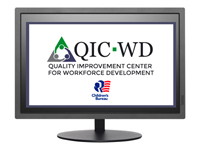Child Welfare Quality Improvement Center for Workforce Development (QIC-WD)
Date of this Version
5-2022
Document Type
Article
Abstract
Exploration of Needs
The Quality Improvement Center for Workforce Development (QIC-WD) worked with the Eastern Band of Cherokee Indians Family Safety Program (FSP) to conduct a needs assessment. A variety of information was explored to learn about the current workforce and the agency’s child welfare workforce practices, including 1) recruitment, hiring, and retention metrics and processes, 2) organizational culture and climate, and 3) other workforce processes and initiatives, such as onboarding, mentoring, supervision, performance management, and employee recognition. More specifically, four major types of information were considered: 1) objective administrative data; 2) subjective perceptions of staff and supervisors, gathered through surveys and focus groups; 3) expertise and input of the project implementation team; and 4) QIC-WD team expertise and feedback. The goal was to identify areas of need that could be addressed through a workforce intervention that met a set of QIC-WD criteria.
Identification of Priority Needs
Three areas of need were identified as offering the strongest opportunities for intervention through the QIC-WD project:
- team cohesion across the various agency units,
- unhealthy levels of employee stress and work overload, and
- inconsistent onboarding practices.
For each area, a problem statement was developed and in-depth root cause analysis discussions were conducted. These discussions helped the team to better understand the dynamics and underlying factors that contributed to the identified issues. Theories of change were developed for each area of need, to provide road maps for addressing the underlying causes and achieving desired outcomes.
Intervention Selection
To determine which intervention to implement, the following QIC-WD criteria were considered: 1) alignment with agency need, 2) level of existing evidence of effectiveness, 3) applicability to other agencies’ needs and circumstances, 4) scope and magnitude, relative to agency and QIC-WD capacity, 5) evaluation potential, 6) contribution to a diverse array of interventions across QIC-WD sites, and 6) agreeable to both the agency and the QIC-WD. Through discussion following the root cause analysis and theory of change exercises, the implementation team decided to focus on the onboarding program for new social workers because it addressed root causes related to multiple identified needs.
Included in
Industrial and Organizational Psychology Commons, Performance Management Commons, Public Policy Commons, Social Welfare Commons, Social Work Commons, Training and Development Commons


